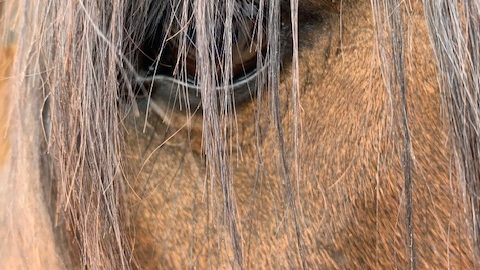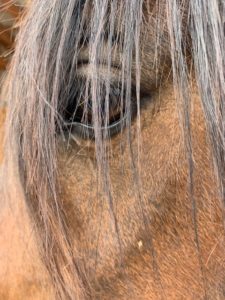 What is it we love about horses so much? Where does our love come from?
What is it we love about horses so much? Where does our love come from?
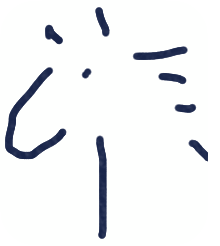 I think about how primal it is. If I find a stick in a V form that has one end 1/3 shorter than the other, I think of a horse head. If I pick up a rock in the same shape, I think of a horse and start mentally drawing in the rest of the details.
I think about how primal it is. If I find a stick in a V form that has one end 1/3 shorter than the other, I think of a horse head. If I pick up a rock in the same shape, I think of a horse and start mentally drawing in the rest of the details.
For many moons, Native Americans created fetishes starting with a rock in a shape that made them think of the animal and then carved it into the form it inspired – done with many other animal shapes as well. These fetishes are used for ceremonies and to give thanks for having particular animals in their lives – for transportation, food, clothing and shelter. Horses were a valuable resource and were seen more for what they could provide. But through that relationship, bonds were formed.
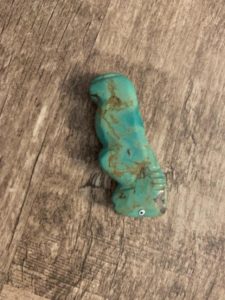
Others in my family came before me in their love for horses. Both my grandfathers loved them, yet only one of my immediate family was interested in them. I carried it forward, an obsession suppressed by other things in life for a time but that came up again at the first opportunity. For some people, riding is the obsession, for others, the presence of horses is an obsession in itself, the close bond we can form. Or, all of the above.
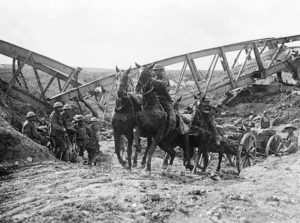
One of my grandfathers took care of a number of horses during World War I. They were on the front lines of battle. Cannon horses. Imagine for a moment what that might have felt like, caring for animals who were incredibly brave. Horses by their natures, are not incredibly brave, but would under normal circumstances, flee at the first sign of danger. These horses were ridden or pulled cannon wagons into the face of danger, many never to return. They watched men and horses they may have cared for fall and were surrounded by death, gunfire and violence.
To develop bravery and a deep bond with animals under this much stress is really a testament to both the men in battle and the horses’ ability to form such bonds.
There may be many animals on the ranch or farm but a horse has a special place for a lot of people. The horse may help with ranch work or have some other job. For people who didn’t have horses growing up, perhaps they discover horses in mid-life, through riding lessons, or some other contact.
Lives take turns that involve careers, children, opportunities, illnesses, commitments, many of which don’t involve horses. Horses are a commitment in themselves, so there are times when they are just too time-consuming or expensive to possess.
These days we have the luxury of loving horses without using them as our mode of transportation. A horse recognizes her ability to help humans, they will do this if they feel met and understood. When I get on a horse I feel a great sense of gratitude sweep over me, that this animal has chosen to want to be in this relationship with me. To some, it may seem like a luxury to own a horse or two who need homes, but are not necessarily tasked with a special job.
I think of how I hurry to finish work that I don’t really want to do in order to be with the horses, carve out a period of time to ride, make up excuses to be with the horses rather than do laundry or repair something. (Ask me to repair a headstall and I’m on it).
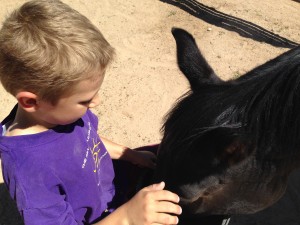
Perhaps I’m making up for all those years when I didn’t have enough of horses in my life. When I had to hide my jodphurs in the back of the closet so my mother didn’t find them and wash them, washing away that wonderful horse smell. All the years that were spend working, raising children, and being part of lives that had nothing to do with horses. I have lived a double or triple life, and one of them involves and centers around horses.
When horses are treated well, emotionally as well as physically, I believe, from my own experience, they enjoy performance. They enjoy doing things well, and being part of a partnership. They are less likely to enjoy performance if treated as a tool.
At our most recent Liberty clinic, our attendees were all deeply committed to horses, involved in different experiences with them. They came to horses in their own ways, some having had horses all their lives, competing, working with them in ranch life, while others found a love for them later in life.
However you have come to the horse, you can learn this (or may already know it): I can be accepted into herds by being still and being myself. I can meditate and a horse will want to be near me. I can learn a lot about my own energy by seeing how the horse responds to me on any given day.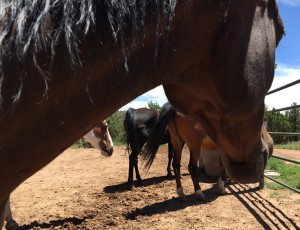
Take the horse who doesn’t want to be caught or haltered. The first thing the human feels may be annoyance. The human is always thinking of his schedule; he’s supposed to meet someone and if he has to spend twenty minutes trying to catch this horse, he’ll be late. The horse feels the urgency and feels pursued, but for some horses, it might be fun to turn this into a game. For some, they may not feel good that day, not in the mood or suffering from a physical ailment the owner isn’t aware of.
It is up to the owner, or catcher in this case, to figure out what he or she is doing that might cause the horse not to want to be caught. Maybe just sit with it. Don’t approach with a halter and lead rope. Take the pressure off.
Was there time or energy to treat a horse with this level of respect when preparing a cannon horse for battle? I don’t know. But I would bet soldiers like my grandpa talked to the horses, did what they could to soothe their terror, dressed their wounds, made them feel that however hideous and awful the human-induced trauma they stepped into, someone loved and cared about them.
Today, we have more horses needing homes than ever before. We have more horses who have experienced great trauma in their lives, comparable in many ways to the cannon horses, yet without any sense of purpose attached. We have an amazing amount of knowledge at our disposal about horses, both scientific and empirical, and knowledge acquired from paying attention to them. It is not so much a luxury to spend this time with horses as it is a huge benefit and deep gift to learn and figure out why they may behave a certain way.
We have horses who put up with a lot who seem to have layer upon layer of indignity heaped on them and one day just resist, full on. We have horses who resist a lot but one day they understand, and all that resistance melts away.
- Why does a horse feel it needs to buck when someone wants to get on?
- Why does a horse not want to go through a gate?
- Why does a horse choose one person over another?
- Why does a horse cry as though it’s the end of the world when its pasture mate is walked out of sight, or even within sight?
Ralph Waldo Emerson said, “Riding a horse is not a gentle hobby, to be picked up and laid down like a game of solitaire. It is a grand passion. It seizes a person whole and once it has done so, he/she will have to accept that his life will be radically changed.”
I would alter that quote slightly to say “Owning or loving a horse is not a gentle hobby…” because you don’t need to ride to have this grand passion.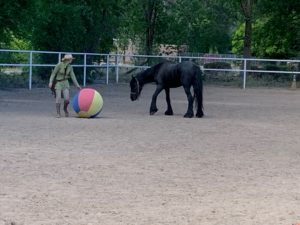
People like my grandpa never owned his own horse nor did he ride much. After the war he became a drayman in London and took care of cart horses delivering goods. My guess is he had been “seized whole” by that love for them, never to be the same again.
As part of our “grand passion,” we care about the “why” of the horse – why he is having trouble in life, why he feels such pain at certain activities. Sometimes, a simple offering – a scratch behind the ears, a tuft of grass, is all that is needed. Sometimes a more consistent contact meets the demand.
Some days it’s valuable to remember what path brought you to horses in the first place. I’d like to hear about it.



